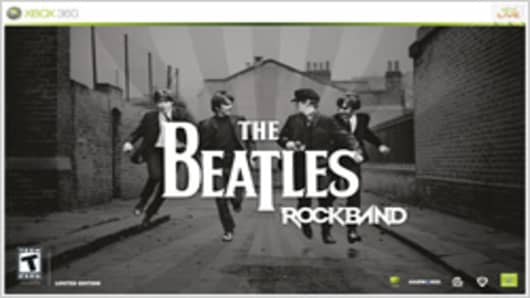The 2009 version of Beatlemania appears to have nothing on the 60s.
Despite an extensive marketing campaign, positive reviews and some of the most widespread media attention ever given to a video game, “The Beatles: Rock Band” had a relatively lackluster first month on store shelves.
The game did beat its chief competition —Activision’s “Guitar Hero 5” — by nearly a 2:1 margin in September. And, as developer Harmonix and Electronic Arts were quick to point out, that victory was achieved despite Activision offering a free copy of the upcoming “Guitar Hero: Van Halen” to buyers of “GH5.”
That’s fine on the surface, but analysts were expecting the appeal of the Fab Four to move more than 1 million copies of the game last month. Instead, it sold just 583,000, according to numbers from the NPD Group.
Microsoft’s Xbox led the pack, with 254,000 copies sold for the system. The Nintendo Wii moved 208,600 copies. And Sony (SNE) saw nearly 121,000 copies sold for the PS3.
MTV Games, which owns Harmonix, says it was anything but disappointed with the September sales—and that the game is selling on track with its internal expectations.
The less than stellar performance of “The Beatles: Rock Band” is tied, in part, to the ongoing woes of the music/dance genre. While September showed a 72 percent dollar sales increase over the 2008 numbers, the category as a whole is still down markedly year-over-year.
“This was a genre that had done very well,” says Billy Pidgeon of Game Changer Research. “I think Activision and Harmonix and various karaoke games have been slamming new content into the stores so fast that it has caused some consumer fatigue.”
- Slideshow: 10 Curious Game-to-Movie Conversions
Some players, meanwhile, say the game itself was too similar to previous “Rock Band” titles.
Dr. Whit Anderson bought an early copy of the game, but one month later is planning to trade it in at Gamestop to supplement the cost of a newer title. “[It] felt like an expansion to me, not a full release,” he says. “[It was] cool, but not quite enough to be a stand alone game ($60) purchase.”
The crossover potential of The Beatles with today’s core gamers, who are more likely to be listening to Blink 182 and Jay-Z, isn’t exactly ideal. The group might be timeless, but they’re still a Baby Boomer band at their core.
There is an upside to that, though. The mainstream appeal could give “The Beatles: Rock Band” a long tail at retail. With the holiday season about to arrive, shoppers could view it as a good gift item — especially for older gamers.
And, as console prices continue to drop over the coming years, the typical buyer will be more mainstream than hardcore. That could bode well for the game.
The financial performance of “The Beatles: Rock Band” doesn’t end at the retail register, either. Like other “Rock Band” games, players can purchase downloadable content to expand the game experience. So far, they seem eager to do so.
The game itself shipped with 45 songs. A 46th — “All You Need is Love” — was downloadable via Xbox Live for $2. Harmonix reports that over 100,000 people downloaded the song in September.
On Wednesday, the company released the “Abbey Road” album as downloadable content for players, letting them play songs from the album that were not included with the original game, including “Maxwell's Silver Hammer” and “She Came in Through the Bathroom Window.” Individual songs again cost $2 and the complete album will cost $17 on the PS3 and Xbox 360.
That doesn’t mute the disappointment in the initial numbers, given the hype for the game. Pidgeon, however, notes that regardless of its initial sales, “The Beatles: Rock Band” succeeded on other, less tangible levels.
“I’d say it’s a bit of a disappointment, but I’m not that surprised,” he says. “I think this was more a vanity deal that gave publicity to [MTV’s games unit] and to the Beatles reissues on CD.”
According to EMI, notes sales of those digitally remastered CDs in North America, Japan and the U.K. topped 2.25 million copies in the first five days – meaning maybe Beatlemania is still alive — but it’s not a phenomenon that translates well to more modern forms of entertainment.



